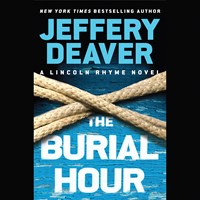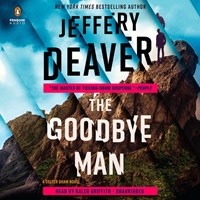Talking with Jeffery Deaver
Jeffery Deaver has been many things in his life: a journalist, a folk singer, an attorney, and a published poet. Originally from Illinois, he now lives in North Carolina, where he writes bestselling thrillers, raises show dogs, and listens to audiobooks. He listens in the car, in bed, and even while cooking. It’s something he and his girlfriend enjoy doing together.
He does nearly all of his listening by way of digital sound files, either on his computer or with his iPod. “I have I-don’t-know-how-many books on CD,” he says. “But the downloads are so much easier. When I first got on iTunes, it seemed like they had maybe 30 or 40 audiobooks. Now they have all the bestsellers. And my Audible account goes right into iTunes.”
Deaver is currently involved in a “top-secret” project: He’s been given a license to kill--at least on paper--by the Ian Fleming estate. He’s currently under contract to pen the next James Bond novel, which will take Agent 007 across the world and is certain to surprise readers with some of his trademark twists.
Whether writing his Lincoln Rhyme novels, one of his other series, or his stand-alone thrillers or short stories, Deaver is a consummate storyteller. “Style is aural. There’s just something about a good turn of phrase, not in a clever punning way, but in that it just sounds nice. When I sit down to write, I always try to do it in a way that there’s kind of a catchiness about what I write--so that in the oral tradition of storytelling it’s more memorable.”
Writing good dialogue requires a different set of skills for the writer. “When it comes to dialogue, which is so very important in any kind of fiction, I’m very conscious that the story I’m telling will be enhanced if there is an aural quality to the writing.”
Deaver has great respect for the art of audiobook narrating. It turns out that Simon & Schuster Audio asked him to read the introductions he’d written for his two short story collections. “Fifty takes!” he says. “It was a nightmare. I love public speaking, but I can’t for the life of me get up there and do it right.”
In Jeffery Deaver’s experience, reading a book and listening to a book are two different experiences. “When I’m reading the words, I tend to be more reflective, a bit more distant--more of an observer when I’m reading printed words. But when I’m listening to a book, it’s more emotional, more participatory. I’m more engaged.”
Providing an example of the ideal experience for audiobook listeners, Deaver adds, “I was recently listening to Robert Harris’s THE GHOST. The reader [Roger Rees] was fantastic. He didn’t change the voices so much that it was self-conscious. He didn’t try to do a woman’s voice, for instance. He just changed subtly enough that you could clearly distinguish between the characters. And yet I felt like I was in the room with those people.”
He likens the difference between reading and listening to seeing a movie on TV as opposed to watching it on a theater screen. “Watching a movie on TV, the telephone is always nearby, and the light on, and there may be other people. That’s like reading a book.” But when you press “Play” on an audiobook, your time and attention are controlled by the author and the narrator. “That experience is more like going into a movie theater, where you take your seat and are emotionally participating more fully in the event.”
Throughout the summer, Deaver is touring the UK, Italy, and the U.S. with
THE BURNING WIRE. Meanwhile, he’s busily plotting the James Bond novel, currently known as “Project X,” slated for publication in May of 2011.--Steven E. Steinbock
AUG/SEP 10
© AudioFile 2010, Portland, Maine
Photo © Isabelle Boccon-Gibod










